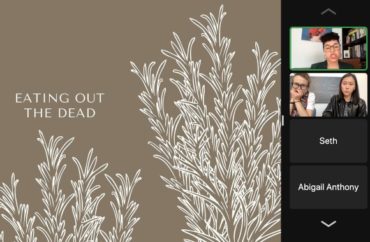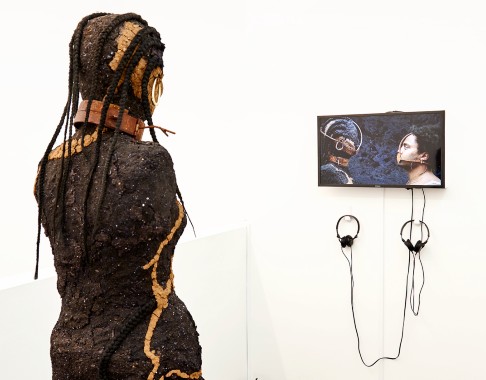
Editor’s note: Contains graphic content
Dirt eating, associated with blackness, is objectifying and possibly dangerous, but also could be spiritual, erotic, or a way to resist capitalism and slavery, scholar argues
Princeton University hosted an online event with Kimberly Bain, an English professor the University of British Columbia-Vancouver, who explored the symbolism of soil, “black alchemical practices” and “eating out the dead.”
Bain’s event, titled “Black Soil,” was attended by The College Fix.
The Feb. 15 event explored the “erotic relations between Blackness, soil, and Dead (matter),” which “disrupt and refuse the circuits of racial capitalism that establish both Black bodies and soil as sites of resource depletion and commodification,” according to the event page.
The “Ecotheories Colloquium” presentation was derived from Bain’s upcoming book, “Dirt: Soil and Other Dark Matter.” The event did not include a trigger warning.
“I turn to dirt for understanding how Blackness—a series of relations that have emerged as part of extractive and accumulative logics—has shaped global considerations of the Anthropocene and refused the extractive relations of racial capitalism,” Bain wrote on the book’s website.
Bain, an assistant professor in the Department of English Language and Literatures, began the Zoom lecture with a land acknowledgement: “I am joining you all from the traditional, ancestral, and unceded territory of the Coast Salish people. …The sort of painful genocide and histories of forced occupation of their territories remains unresolved.”
Bain’s talk argued that geological extraction and labor of black people are both “commodifying” and exemplify “racial capitalism.”
“Bodies marked as black become the technology by which the extraction of raw materials and resources from the earth might be achieved. All the while, black flesh continues to serve as a conceptual and material ground for extraction,” Bain said.
She argued that extracting geological materials and labor from black individuals “emerge from the same impulse,” describing both as sites of “resource depletion” and “commodification.”
“When racial capitalism placed open black flesh and earthly matter, leaving both for dead, what we do with the dead becomes a practice of black alchemy,” Bain said.
She said “black alchemy names an erotic and ethical orientation toward the dead and dead matter” and “black alchemical practices” offer a method to show “how blackness does not exist for those relations.”
Dirt and soil have offered black people “alternative modes of living with and being with the dead,” which creates “a kind of black alchemy,” she said.
Bain, who earned a doctorate in English and interdisciplinary study from Princeton, did not respond to a request for comment by The College Fix.
Dirt eating, associated with blackness, is objectifying and possibly dangerous but also could be spiritual, erotic, or a way to resist capitalism and slavery
 Bain showed a video of Kiyan Williams’ 2019 multimedia performance art installation “Dirt Eater,” which featured Williams removing a muzzle and then licking, sucking, tonguing, biting and nibbling a female sculpture partially made from soil, thereby turning the soil into mud.
Bain showed a video of Kiyan Williams’ 2019 multimedia performance art installation “Dirt Eater,” which featured Williams removing a muzzle and then licking, sucking, tonguing, biting and nibbling a female sculpture partially made from soil, thereby turning the soil into mud.
The sculpture (detail pictured) is molded after Anastasia Escrava, and the muzzle represents the iron muzzle she was forced to wear, which was also used to prevent dirt-eating.
“As Williams smears the brown matter all over their face, chin, neck, cheek, gums … the mouth erupts as a site for capaciously sexual acts and sexual pleasure, mired in dirt and dirtiness. These acts are both autoerotic—so sucking and licking oneself off, as it were—and they are also alchemical, an alchemical re-enlivening of the dirt via saliva and spit,” Bain said.
Dirt also “holds the racial, sexual formation of ‘dirty,’ which also conjure affects of shame, and states of objection, as much as it does the funky erotics and ecstatic being,” she said.
Bain also referenced Jennifer Nash’s 2014 article “Black Anality,” a term defined as describing “how black pleasures are represented as peculiarly and particularly oriented toward the anus, and thus as peculiarly and particularly attached to anal ideologies,” which emphasizes “spatiality, waste, toxicity, and filth.”
Bain compared queer and dirt-eating desires, suggesting both are framed as “dirty” and “secrets.” She referenced an anecdote from E. Patrick Johnson’s book “Black. Queer. Southern. Women,” in which a granddaughter is queer and her grandmother eats dirt.
“The act of dirt-eating that Williams engages in is not this act of simply placing dirt in their mouth and eating it. Williams, rather, is eating dirt, and therefore eating out the dead,” Bain said.
Bain summarized the history of dirt-eating in the Caribbean and Americas, especially among slaves and Obeah religious practitioners, which was understood to enable spiritual connections with the deceased.
Bain specifically cited the cases of slaves mixing grave dirt with rum in Antigua and Jamaica as a form of oath, which Bain characterized as black alchemy.
Bain also described the potential negative effects of dirt-eating, including parasitic infections, metal poisoning, and kidney failure, sometimes resulting in death. Bain suggested it is unclear whether slaves ate dirt to supplement their impoverished diets, or if it was “strategically employed” to “disrupt the workings of the plantation.”
Anne Cheng and William Gleason, two English Department professors who attended the event, did not respond to a request for comment from The Fix.
The series was hosted by the English Department’s Contemporary Poetry Colloquium, High Meadows Environmental Institute, Environmental Media Lab, Bain-Swiggett Poetry Fund, Effron Center for the Study of America, Interdisciplinary Doctoral Program in the Humanities, and University Center for Human Values.
MORE: The problem with English departments: they don’t teach English
IMAGE: Main, Abigail Anthony for The College Fix; Inside, Kyle Knodell
Like The College Fix on Facebook / Follow us on Twitter






Please join the conversation about our stories on Facebook, Twitter, Instagram, Reddit, MeWe, Rumble, Gab, Minds and Gettr.